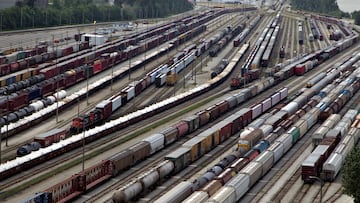Canada rail strike: How would the train strike affect the US?
Canada’s two largest railroads are in a dispute with the Teamsters union that could lead to cross-border trade disruptions with the United States..

Canada’s two largest railroads, Canadian Pacific Kansas City and Canadian National, are locked in a labor dispute with the Teamsters union that threatens to spark strikes that would directly impact cross-border trade with the United States, according to CBS News insiders.
For now, both railroads have stopped accepting certain shipments of hazardous materials and refrigerated products, while starting Tuesday, Aug. 20, Canadian Pacific Kansas City will stop all shipments originating from both the United States and Canada. Meanwhile, Canadian National has already banned the import of containers from United States railroads.
While negotiations between the railroad workers and the union are ongoing, there has been no significant progress in lobbying so far. According to Jeff Windau, an industrial analyst for Edward Jones & Co., the work stoppages are expected to last only a few days; otherwise there could be significant disruptions to the supply chain.
“If something were to drag on for longer, I think there would be some significant potential problems given the amount of freight that is handled every day,” Windau told CBS News. “In general, railroads affect almost the entire economy.”
READ ALSO: New Jersey commuters to receive free transportation
Some food, medicine and key chemicals are no longer being moved by CN or CPKS, as Canada's largest rail companies prepare to potentially lockout over 9000 workers
— Mackenzie Gray (@Gray_Mackenzie) August 16, 2024
Here's my story on how next Thursday could be the 1st time in modern Canadian history when the railroad did not run pic.twitter.com/QicBLqiIMX
READ ALSO: Chicken products recalled for possible metal contamination
Canada rail strike: How would a train strike affect the US?
According to Windau, Canadian Pacific Kansas City and Canadian National transport about 40,000 railcars of freight each day, valued at $1 billion.
Related stories
This means a rail strike in Canada would significantly disrupt supply chains, causing damage to a range of sectors, including the auto, chemical and agricultural industries.
Since a strike would disrupt U.S. supply chains, the halt in operations would severely affect the U.S. economy, specifically areas that rely on cross-border trade and key industrial sectors.


Complete your personal details to comment